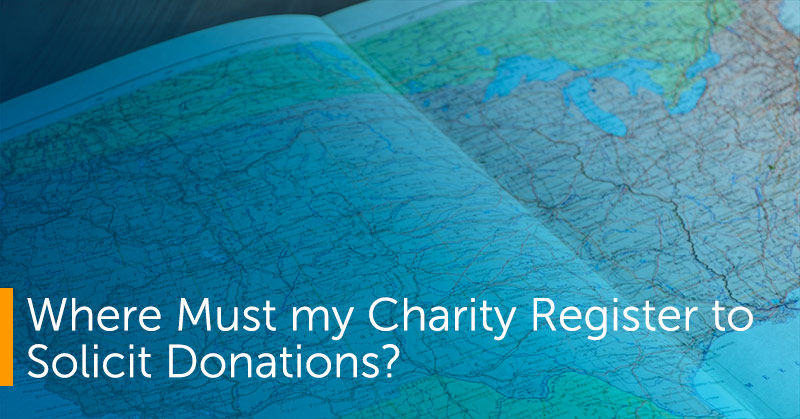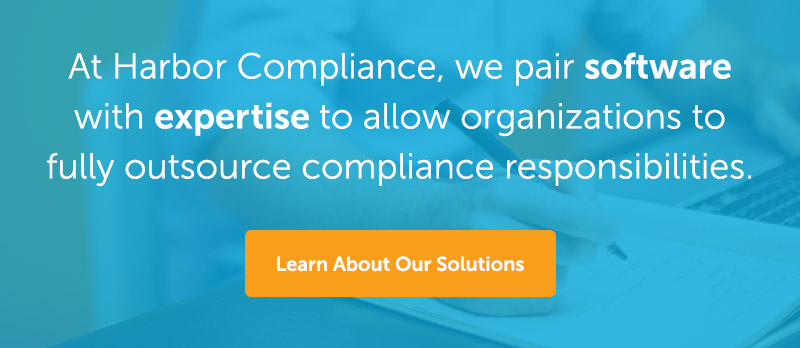-
Software
Compliance Software
Oversee licenses, track renewals, access documents, and more from a single interface.
Software Overview -
Services
Compliance Services
Full service compliance solutions for organizations throughout their entire lifecycles.
Services Overview -
Industries
-
Partner
- Information Center
Where Must my Charity Register to Solicit Donations?
If your charity fundraises, it is generally required to register for charitable solicitation. But with registration being completed on the state-level and the requirements varying by state, how do you know where you need to register?

Generally speaking, charities must register in any state in which they solicit donations. In simple terms, soliciting is asking for a donation. Asking for donations can take many forms and include hosting fundraising events, mailing appeal letters, making phone calls, and sending emails. Many organizations solicit donations on their websites through “Donate Now” buttons. Even applying for grants is generally considered a form of solicitation. In today’s world, most charities solicit in not one or two, but a variety of different ways.
Charitable solicitation requirements can apply even if your charity does not raise any funds in a certain state. In most states, the act of soliciting is what determines when these requirements apply, not the receipt of donations or the receipt of a substantial amount of donations. If your charity solicits in a given state, it must comply with that state’s requirements.
Now, you may be asking yourself:
- What if we don’t receive any donations in certain states? Generally, states regulate the act of solicitation itself, regardless of whether your charity receives any funds as a result. If you solicit in a state, review that state’s requirements and complete the registration accordingly.
- What if we receive very few donations? Again, the act of solicitation generally triggers registration requirements, not the receipt of donations. Based on fundraising income, you may qualify for an exemption from full registration, but this rarely eliminates your reporting requirements in a state.
- We’re a very small organization, how can we be expected to register in all 41 states? If you want to be proactive and ensure 100% compliance, you can file a registration or exemption in every state in which the organization solicits and that has a registration requirement. Smaller charities concerned about cost can register in a certain number of states and exclude the rest from their solicitation activities.
- Why are we only hearing about this now? Are these new requirements? No; these requirements have been in place for a long time, but there is starting to be heightened awareness. States want to know that only legitimate organizations are soliciting, and that donors’ money supports the advertised cause. Many charities find out about the requirements only after they lose a big donation, a complaint is filed, or action is taken against them. With a proactive approach to compliance, your charity can avoid various adverse penalties.
- Is everyone else noncompliant like we are? Many nonprofit leaders think that having a 501(c)(3) exemption is enough to fundraise limitlessly. The truth is many organizations are noncompliant at the state level, and face hefty penalties once the states catch up to them. However, not everyone is noncompliant. Charities look for ways to distinguish their causes, and being in compliance certainly helps to that end.
3 Example Cases:
Example A: A community-based organization is located in Florida and hosts local fundraising events. It solicits local businesses and individuals by phone calls and letters. The organization has a website but does not have an interactive “Donate Now” function or ask for donations online.
Organization solicits in Florida and must register in Florida.
Example B: Same facts as Example A except the organization has an interactive “Donate Now” button on its website. The organization receives donations from residents in all states, albeit in varying amounts. The charity sends emails to its donor list and letters annually asking for additional donations.
Organization solicits nationwide. It must register in each state where required or clearly exclude solicitation in states in which it is not registered.
Example C: A large organization has program services in every state and has been operating for 50 years. Its donor base includes grants, corporate and individual gifts, and other funding from sources nationwide. The organization has effective email fundraising campaigns, donor tracking, and a “Donate Now” button for receiving donations through the website.
Organization solicits nationwide. The organization must file in each state that has a registration requirement. Despite soliciting for many years, the charity will face minimal penalties as long as registration is proactive and not in response to a state action.
Unfortunately, you don’t get to pick and choose state requirements. The requirements are what they are. If you solicit, you are required to register. What you can do is determine whether your charity solicits in a state, and file the appropriate registration or exemption as required. Charitable solicitation requirements are based on the act of soliciting, not receiving funds. Organizations that solicit in every state must generally register in every state that requires registration in order to ensure full compliance.
Moving Forward
It’s no secret that managing charitable solicitation compliance is a complex and time-consuming task. Our approach is to pair software with expertise to allow organizations to fully outsource the responsibilities. Regardless of what stage an organization is in, we follow the best practices we’ve learned through our extensive experience to help ensure organizations are compliant while minimizing their time and financial investment. Learn about how you can put your compliance on autopilot with our compliance solutions.






